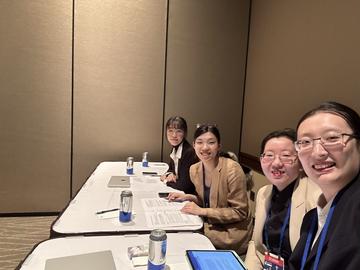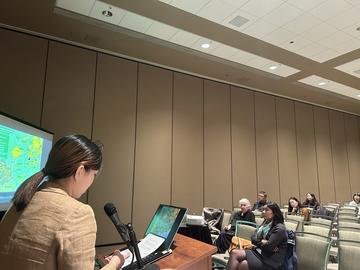Association for Asian Studies (AAS) conference 2024 - report by Nora Yitong Qiu

In March 2024 I had the opportunity to attend and present my Global Correspondent Banking (GloCoBank) project research at the Association for Asian Studies (AAS) Conference 2024 which was held in Seattle, USA. AAS is a scholarly, non-political, and non-profit professional association open to all those with an interest in the study of Asia and is the largest society of its kind with approximately 6,500 members worldwide. The annual meeting is a place for Asian scholars to share and discuss their new research, to network and to reconnect with colleagues from across the world that they have met during archive visits and at other conferences. This is the second time I have attended the conference and it provided a unique opportunity to introduce the GloCoBank project to the Asian Studies community.
I organized a panel, Money, Plague, and Migrants: Mapping East Asia's Financial Frontier, which brought together experts with an interest in East Asia's financial development from the 18th to the 20th century. With Jonathan Schlesinger as chair and Matthew Mosca as discussant, the papers presented new and original archival evidence which aimed to challenge and expand our understanding of revolution, migration, borderlands, and medical history from both broad and detailed perspectives, shining a light on these overlooked narratives.
My paper was on The Fall of Qing and the Rise of East Asia’s Global Payment System, 1870-1912. Drawing from an extensive collection of archival materials collected during visits to archives in China and Japan in summer 2023, the paper delves into a critical period of transition, revealing the significant impact of European banks in connecting East Asia with the global capital market. I examine the Qing dynasty's failed attempts to modernize its banking system, thwarted by deep-rooted mistrust between the government and the merchant community. The paper underscores the crucial role European banks, such as HSBC, Deutsch-Asiatische Bank, and Chase Bank, played during this era. These institutions not only won the market's trust but also established a dominant presence, becoming essential links between China and the global financial system. The study explores the networks these banks formed with China's modern banks and government, offering insights into their operations and broader fiscal implications. The Qing government's reliance on European banks for international business transactions highlights the challenges China faced in its quest for financial modernization.

Insights presented by panel members called for a reassessment of the region's financial history and a need to promote a more nuanced understanding of the dynamic factors influencing East Asia's economic landscape. Through continued analysis and discussion, we seek to cultivate a deeper appreciation for the complex narratives that constitute East Asia's financial past. The panel drew an audience of 30 junior and senior colleagues, including members of the wider Asian Studies community, indicating a broad interest in the lesser-known aspects of financial history and the intricate international linkages that have influenced East Asia's economic trajectory. I am especially grateful for inquiries posed by colleagues regarding the Shanghai stock market crisis.
During the three-and-a-half-day span of the conference, I participated in a series of panels that offered profound insights into the intersection of finance with political and social dynamics in Asia. These discussions not only illuminated the nuanced interplay between economic and financial policies and their political contexts but also contributed significantly to our understanding of correspondent banking within the region. One notable panel, organized by Jason Luo, titled Power Plays: Politics and Money in Contemporary China, delved into the complexities of how political decisions and movements influence economic policies and financial systems in China. This exploration is crucial for understanding the broader implications of political stability and policy on financial markets and banking practices, including the operation of correspondent banking networks.
Another panel, focusing on Philippine Economic Historiography, sought to challenge misconceptions in the country's economic narrative. By addressing the oversimplified explanations that have historically attributed significant economic and social trends to the actions of a few individuals, this panel shed light on the legal frameworks, commodity markets, and institutional developments. The insights garnered from these panels enrich our project by emphasizing the important political and social contexts in which financial networks operate. Understanding the interplay between these factors allows us to better grasp the historical challenges and opportunities in establishing correspondent banking linkages in Asia.
Overall my participation in the AAS Conference was personally and professionally enriching, providing opportunities to discover new research insights in cognate areas, to network with scholars of Qing history and the Manchu study group, including academics from the US, UK, China, Europe, and Canada, and critically in advancing the reach and relevance of our project.
Nora Yitong Qiu (March 2024)
Money, Plague, and Migrants: Mapping East Asia's Financial Frontier
Chair: Jonathan Schlesinger; Discussant: Mathew Mosca; Organizer: Nora Yitong Qiu
Finance determines the fate of not only individuals but also the state. Yet, economic historians often look into the riches and the winners. Very few focuses on examining fiscal failures, the borderlands, and marginal group’s experience. Our panel constitutes four papers, each look into a distinct aspect of East Asia’s financial development from the 18th to the 20th century. We use novel archival evidence to challenge the current understanding of revolution, migration, borderland, and medical history from both macro and micro perspectives. Shaoyu Zhang investigates fiscal challenges and policies during the early Qing dynasty in the south west region. Although copper mining aided the Qing in overcoming fiscal obstacles, new economic relationships sparked enduring conflicts between indigenous groups and Han immigrants. Nora Qiu examines the failure of the Qing government's attempt to modernize its fiscal system. The central and provincial banks, unable to gain market trust or establish effective banking networks, led to the rise of foreign banks. Sining Lyu scrutinizes the fiscal aspect of the 1911 Manchurian Plague. The devastating economic and financial consequences of quarantine, resulted in the loss of the majority of Manchuria's government revenue and state autonomy in transporting strategic goods. Yi Feng investigates overseas migrants' experiences in transferring remittances from abroad to Japan in the early 20th century. She explores the means chosen by migrants and the local banking networks they engaged with. This panel offers a more nuanced understanding of the overlooked aspects in East Asia's financial history.
The Fall of Qing and the Rise of East Asia’s Global Payment System 1870-1912
Nora Yitong Qiu
China’s traditional banking system by the mid-19th century could not fulfil the rapid need raised from China’s fiscal and technological modernization. The Qing government officials realized the importance of establishing a modern central bank and European style banks. They tried to achieve their goal by founding central and provincial joint stock limited banks, half owned by the state and half owned by the merchants. However, all of these attempts failed. European banks won the trust of the market, became the dominant player, connecting China’s market to the global capital. Why did China’s government failed to achieve their goal? What role did European banks play in helping China’s government and merchants in conducting international business? What correspondent network did they form with China’s modern bank and government? This paper use novel archive materials collected from HSBC, Beijing No.1 Historical Archive, Shanghai municipal archive, Tianjing municipal archive and Liaoning provincial archive to build a textual database on banking documents. The government memorials, newspapers, private letters and bank receipts show that the government failure of setting up a central bank had deep roots in the distrust developed between the merchant community and government. Even the government itself used European banks to conduct international business, buying weapons and machinery. HSBC, Deutsch-Asiatische Bank, and Chase Bank’s dominance had strong correlation with their connections to the central government and their wide correspondent networks. European’s colonization gave foreign banks protection from local violent insurgence, providing a safe haven for both the government and capitalists.



